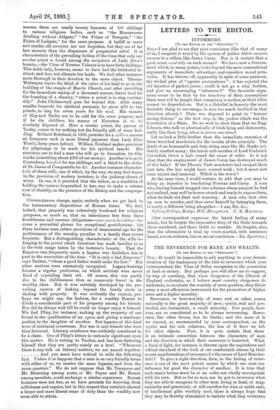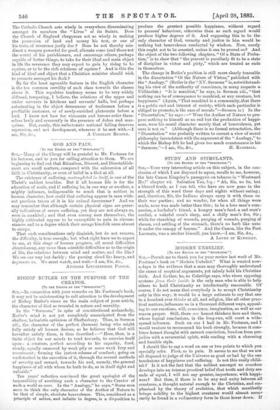THE REVERENCE FOR RANK AND WEALTH.
[To THE EDITOR OF THE " SPECTATOILl SIR,-It would be impossible to add anything to your demon- stration of the inadequacy of the title to reverence which your correspondent, the Vicar of Selby, recognises in the possession of land or money. But perhaps you will allow me to suggest, by way of corollary, that when clergymen of the Church of England undertake, as I believe most country clergymen do undertake, to inculcate the worship of mere position, they throw away a most efficacious instrument for the promotion of higher aims and a higher morality.
Reverence, or hero-worship of some sort or other, comes naturally to the great majority of men ; cynics, real and pre- tended, are, fortunately, a small minority. Few people, how- ever, are so constituted as to be always reverencing. Rever- ence, like other forces, has its limits ; and the more of it we expend, as recommended by your correspondent, on the squire and his rich relations, the less of it have we left for other objects. Now, it is quite certain that there is an intimate connection between the characters of men and the direction in which their reverence is bestowed. What a flood of light, for instance, is thrown upon the aspirations and ethical standard of the bulk of our comfortable classes by their recent manifestations of reverence for the career of Lord Beacons- field ? To give a right direction, then, to the feeling of rever- ence is one of the most potent means by which one man can influence for good the character of another. It is true that each man's heroes must be of an order not wholly uncongenial with his own. But so far as men can be got to reverence what they are able to recognise in other men, living or dead, of mag- nanimity and generosity, of self-sacrifice for wise or noble ends, of intellectual gifts worthily used, there is always hope that they may be thereby stimulated to imitate what they reverence
The Catholic Church acts wisely in everywhere disseminating amongst its members the "Lives" of its Saints. Does the Church of England clergyman act as wisely in making the possession of land and money his test, or one of his tests, of reverence justly due P Does he not thereby mis- direct a weapon powerful for good, alienate some (and those not the worst) of his parishioners, and encourage others, perhaps capable of better things, to take for their ideal and main object in life the reverence they may expect to gain by rising to be squires, or to be the rich relations of squires ? And is this the kind of ideal and object that a Christian minister should wish to promote amongst his flock ?
By far the least agreeable feature in the English character is the too common servility of each class towards the classes above it. This repulsive tendency seems to be very widely diffused, tempering, I believe, the relations of the upper and under servants in kitchens and servants' halls, but perhaps culminating in the abject demeanour of tradesmen before a profitable customer, or of newly-enriched plutocrats before a lord. I know not how far viscounts and barons order them- selves lowly and reverently in the presence of dukes and mar- quises. But, surely, this unfortunate national failing deserves repression, and not development, wherever it be met with.—I



































 Previous page
Previous page